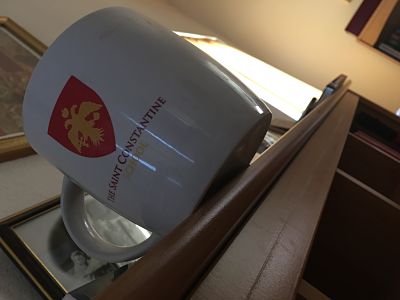 The most dangerous thing my wife ever placed in our house was a headboard with a shelf. Every night my near sighted self is tempted to place objects on this shelf and if you have never been hit in the head by an early iPad, then you do not know how Steve Jobs lied about the weight of the first devices.
The most dangerous thing my wife ever placed in our house was a headboard with a shelf. Every night my near sighted self is tempted to place objects on this shelf and if you have never been hit in the head by an early iPad, then you do not know how Steve Jobs lied about the weight of the first devices.
Now imagine a giant mug of The Saint Constantine School perched perilously above your head and the image of the Sword of Damocles will make sense to you. Call this: the Cup of Constantine. Uneasy are the heads of the crazy folks who decide education must change for the good of the students.
Or not.
We all live on the edge, whether we acknowledge it our not, and the most dangerous posture is to forget our danger. We are mortal men doomed to die and must not live as if we were not on the edge of eternity. We are and that is gloriously freeing.
If faint heart never won fair lady, then faint living never won the fair city. The kingdom is gained by the energetic person who dares to believe God and do what God would do in his or her generation. We might fail. . . the cup may fall on our heads, but if we were not merely foolish, then the risk was worth it. No Christian ever loses or wins in this life, because Paradise is where the score is kept.
Lenin can kill a nun, but only to make her Saint Elizabeth, New Martyr, seeing the beatific vision and praying for Russia. He can only be waxed and put in a glass case to be stared at by an increasingly hostile public. She lived on the secular edge, things crashed around her, and she won.
There is no risk in living at the edge if one pursues God’s will. Of course, much of our risk is not for God, but for our own desires. One reason to belong to an international and large community is to check personal ambitions and desires. My church is not much impressed with my ideas or in need of my service, thanks be to God. We are an ancient community full of world class saints, philosophers, scientists, theologians, and educators. Any idea I have will be corrected, improved, and then supported in the light of that history.
They will force me to build a community of equals. One can be first amongst equals, but nobody is supreme: nobody and certainly not me.
That is life on the edge, but only if you are a worldling . . . someone who keeps score in this age. If you know, the cup will balance, then there is no risk only living a normal Christian life that looks risky from the outside. Of course, the analogy is imperfect. . . the cup really could be put in the center of the shelf without harm, but there is also no harm in this position and much delight. It did not fall! It worked!
It was (it turns out) as safe there as on a table in the kitchen: rock solid, only appearing unstable. Even when shaken, the cup did not fall.
God will ask us to do what appears to be risky, but is in fact not risky at all if we measure by His knowledge and standard. Too often we live nervous lives, keeping score by the standards of secularists (is our school big? do we win the Big Game?) and not as He counts success! We think we are “perilously” balanced, when there is no peril at all . . . only something interesting. . . something inspiring.
We are afraid: the mug might fall, the coffee might spill, we might fail.
And yet the mug did not fall. All is more than well.











